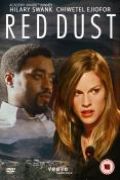
Directed by
Tom Hooper
100 minutes
Rated M
Reviewed by
Ruth Williams

Red Dust
Synopsis:: Smitsriver, South Africa, 2001. Sarah Barcant (Hilary Swank), a New York City prosecutor has been called back to her home town to represent Alex Mpondo (Chiwetel Ejiofor) at the Truth and Reconciliation Commission. Dirk Hendricks (Jamie Bartlett) an ex-policeman has applied for amnesty for torturing Mpondo in 1986. Hendricks figures it is his only chance at having his jail sentence reduced however Mpondo has no intention of letting him off the hook; his best friend Steve Sizela, disappeared at the time and he wants to know what happened to him. He believes that Hendricks holds the key to Steve's disappearance.Whilst Red Dust states that its characters are entirely fictitious, the context of the events it depicts are based in historical fact and there is a measure of truth here that cannot be hidden by the director's conventional disclaimer. It is based on a book of the same name by Gillian Slovo, who had first-hand experience of the Truth and Reconciliation Commission. She attended the hearing of the two men that were charged with her own mother's assassination, an experience from which her novel was partly seeded.
It goes without saying that it would be extremely difficult to consider forgiving the people responsible for the death of a loved one, as it was for Slovo. There were, however, other aspects of the hearing that made an impression on her. 'I got interested in the strength of the bonds that tie old enemies together. The result of my ponderings on this is that Red Dust is not only about justice and the truth, but it's also about intimacy.' It is the effective transposition of this mix that contributes to the success of the film.
As it deals with recorded history, do the credentials of the filmmakers stand up to scrutiny? Red Dust comes with an impressive pedigree. Gillian Slovo is the daughter of Joe Slovo and Ruth First, exiled ANC principals, close colleagues of Nelson Mandela and are considered South Africa's pioneering white anti-apartheid activists. The producer, Anant Singh, is responsible for several anti-apartheid films made in South Africa, including Cry, the Beloved Country. As a matter of interest, he is also the producer of Yesterday which is also currently on general release. And just to add the icing on the cake, Archbishop Desmond Tutu gives the film his official blessing.
The thing that appeals to me about this kind of film is the way in which the content can raise our consciousness about an issue that may have previously only been in the periphery of our understanding. I had heard of the Truth and Reconciliation Commission, but hadn't fully comprehended what it actually meant for the people of South Africa, nor had I realised the full extent to which the black South Africans had suffered under apartheid.
Alex Mpondo's character may be fictitious but he does represent thousands of people who were brutally tortured and many white South Africans were thrown into a state of guilt at what their fellow countrymen had done. Though the events dealt with inside the Truth and Reconciliation courtroom occurred years before, the film allows us to witness present-day incidents outside the courtroom that show that for many the damage still feels fresh and is still very much in need of resolution. We see this amongst the black villagers themselves as well as the remaining white police attempting to close ranks.
There are those who do not approve of filmmakers who fictionalize historical events. They argue that such films distort the truth and turn history into something subjective. Yet surely history is always made up of whoever's interpretation is prevalent at the time. What is important, and what Red Dust does, is to convey the essence of the story.

Want more about this film?


Want something different?




